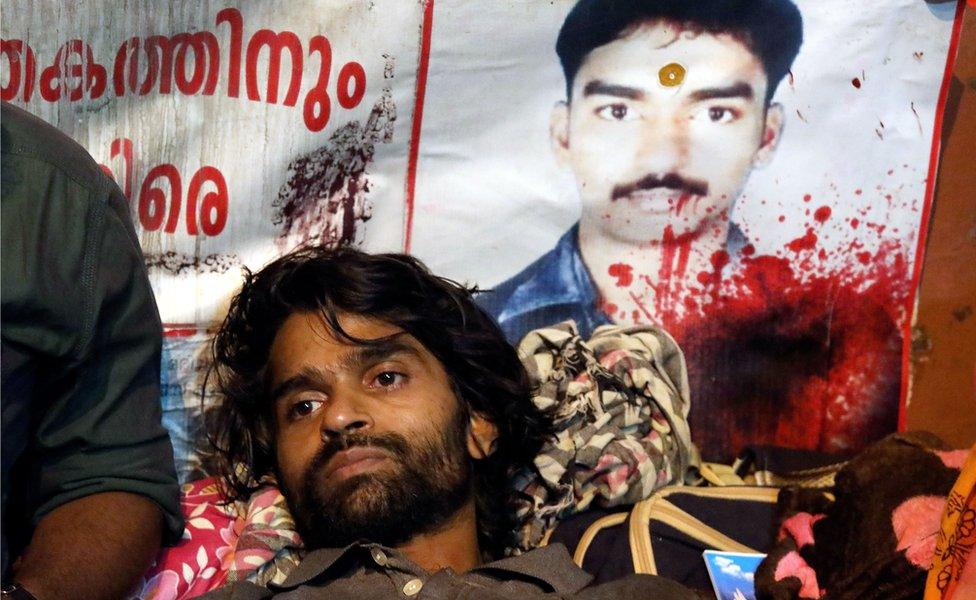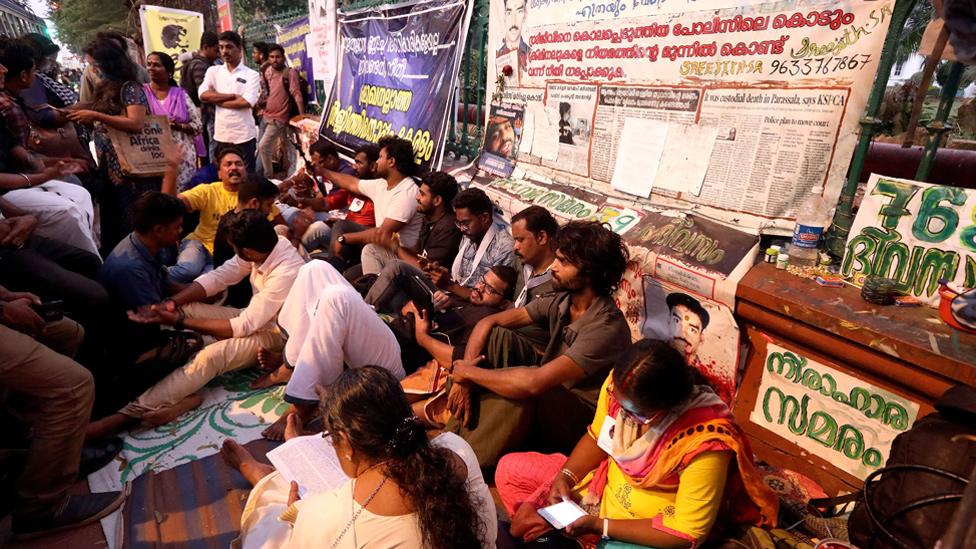Justice for Sreejith: Indian protester becomes social media hero
- Published

SR Sreejith wants an independent inquiry into the death of his brother
An Indian man who has been protesting outside a government office for almost 800 days because he says his brother was murdered by police has become an unlikely social media star. The BBC's Ashraf Padanna reports.
Until recently, no-one paid much attention to SR Sreejith, who has been sitting in the open air outside Kerala's state secretariat in the city of Trivandrum every day since 22 May 2015.
Seated on a mat with little shelter, he has braved scorching summer sun, heavy monsoon rains and even biting cold.
But he has persisted.
"When it rains I take shelter in nearby shops or on the verandas of offices. Sometimes I simply sit here," he told the BBC.
His only demand is for an independent inquiry into the death of his younger brother Sreejeev, who he alleges was killed by police.
In a country only too familiar with police brutality and custodial deaths - India's National Crime Records Bureau says 591 people died in police custody between 2010 and 2015 - his protest has generated particular resonance.
Police say Sreejeev, 26, committed suicide in custody after he was arrested for stealing a mobile phone.
But his family says he was killed because he was in love with a woman who happened to be related to one of the police officers.
He was arrested one day before she was scheduled to get married to someone else. He died in hospital the following day where he was admitted as a result of the "suicide attempt".

Mr Sreejith has been receiving a steady stream of support thanks to social media
Human Rights Watch (HRW) said in an August report on India that suicide and illness are common causes listed by authorities to cover up deaths likely caused by police torture, external.
"I saw my brother tied up to a cot in the government medical college hospital before his death. He wanted to say something. He was wearing an oxygen mask and there were visible bruises on his body. But the police guarding him prevented me from going closer," Mr Sreejith said.
Apart from a few conversations with Kerala's lawmakers who would walk in and out of the building every day, Mr Sreejith's protest largely went unnoticed.
Until, that is, he started gaining attention on social media.

You may also like:

In the past few weeks and months, pictures of him and his protest have been shared widely on Facebook and Twitter along with messages of solidarity, including from some very high profile figures in the state.
Well-known south Indian actor Prithviraj Sukumaran wrote about Mr Sreejith on his social media accounts, external and Tovino Thomas, another prominent actor in Kerala's film industry, joined him at his protest venue.
A hashtag campaign, #JusticeForSreejith, has gained popularity and a song with the same name, composed by popular Indian songwriter Gopi Sundar has received more than half a million views since it was uploaded on 17 January, external.
Allow X content?
This article contains content provided by X. We ask for your permission before anything is loaded, as they may be using cookies and other technologies. You may want to read X’s cookie policy, external and privacy policy, external before accepting. To view this content choose ‘accept and continue’.
And while Mr Sreejith is in high spirits, the protest has taken a clear toll on him. Once a professional bodybuilder, he weighs only 49kg (108lbs) now, and is clearly very weak.
He told the BBC that he was thankful to everyone who had offered him support.
In the face of mounting public pressure, state lawmakers ordered an internal police investigation into his brother's death, but Mr Sreejith refused, insisting that the case be transferred to India's federal investigation agency, the Central Bureau of Investigation (CBI).
Others have started joining him on his protest, and when Mr Sreejith decided to intensify his action from a sitting strike to a hunger strike a few weeks ago, others followed suit.
Some of his supporters have been conducting a "relay fast", where they take it in turns to shun food and water in solidarity with him, and many are joining in his calls for the case be handed over to the CBI.
Allow X content?
This article contains content provided by X. We ask for your permission before anything is loaded, as they may be using cookies and other technologies. You may want to read X’s cookie policy, external and privacy policy, external before accepting. To view this content choose ‘accept and continue’.
Allow X content?
This article contains content provided by X. We ask for your permission before anything is loaded, as they may be using cookies and other technologies. You may want to read X’s cookie policy, external and privacy policy, external before accepting. To view this content choose ‘accept and continue’.
"We are not going to end this campaign until Sreejith gets justice," said Akhil Davis, the convener of a Facebook group that is supporting the protest. "Many of us from far-flung places are camping here for the past few days, and we'll stay back until the CBI takes over the probe."
In May 2016, the State Police Complaints Authority took issue with the police version of events, determining that Sreejeev died "by brutal physical assault in custody".
K Narayana Kurup, who headed the organisation at the time, told the BBC that his detailed investigation, which saw him consult toxicologists, forensic and handwriting experts, convinced him that it was a "clear case" of a custodial killing.
The state then agreed to transfer the case to the CBI, but the agency refused to take it on, saying its hands were full.
However the Kerala high court stepped in last week and ordered the case to be handed over to the CBI. Some media reports have said that the agency has already begun an investigation, but Mr Sreejith is determined not to stop his fast until he is personally assured that the CBI has taken over the case.
"The politicians and police officers want to make out that everything is fine with them. I don't believe their promises," he said. "I'll end the protest the moment the CBI begins the investigation."